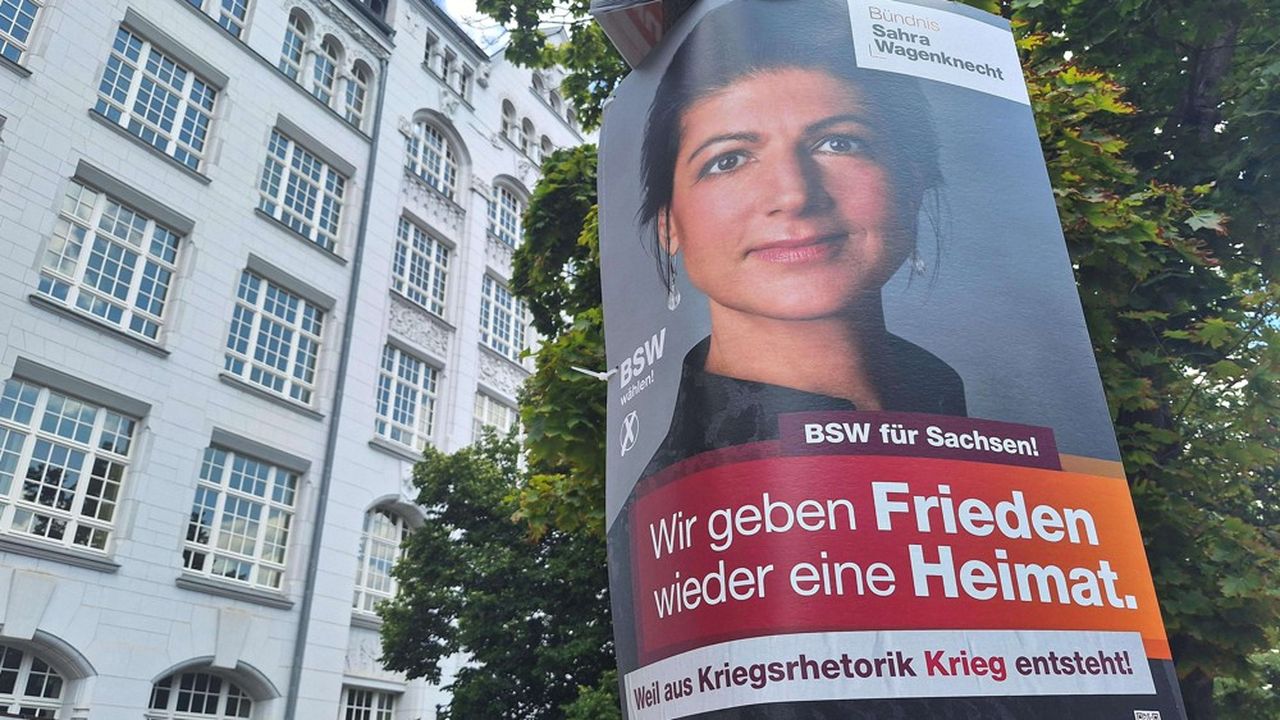
“Peace is everything,” proclaims the far-right poster in Thuringia. “We are giving peace a home again,” replies the Sarah Wagenknecht Alliance, a pro-Russian left-wing populist party. “Peace requires courage,” insists Die Linke, the far-left party in power in Thuringia.
As residents of Saxony and Thuringia elect their representatives to local parliaments this Sunday, peace has emerged as one of the main campaign issues in both eastern German states. The theme is a recurring theme in candidates’ interactions with the population.
Stay away from conflict
While 45 percent of Germans support the idea of participating in a military intervention if a NATO member is attacked, the figure drops to 30 percent in eastern Germany. In this part of the country, 49 percent of respondents prefer the country to stay away from a conflict, according to the latest report by the Allensbach Institute on German Fears. The remaining 21 percent are undecided.
How can this attitude be explained? “Here, support for Ukraine was judged very critically from the beginning, because it was seen as a risk of being drawn into war,” explains Maik Fielitz of the Institute for Democracy and Civil Society in Jena. “Since Berlin expressed its support for Ukraine very quickly and very clearly, it was also seen as a way of expressing criticism of the government.”
A latent anti-Americanism
When you have experienced dictatorship, you also question the state much more easily. East Germans did not believe the media in the GDR era. They do not believe them much more today. In the eastern states, you often hear that the media used to talk a lot about corruption in Ukraine, but not so much today…
“There is also the idea that NATO provoked Russia and that before this conflict, the economy was doing well and the country had cheap energy,” analyses Hans Vorländer, professor at the Institute of Political Science in Dresden. And then there is a latent anti-Americanism, which persists. Only 26% of East Germans consider the United States to be a reliable partner, compared to 50% in the West, indicates the Allensbach study.
“In the GDR, it has been repeated for years that the Americans are, so to speak, the enemy by nature. In families, the idea is still conveyed that we want nothing to do with them, which leads to this astonishing paradox of a certain sympathy for Russia,” explains Tilman Mayer, a political scientist at the University of Bonn.
A more ambiguous local right
In Saxony, the Christian Democrat (CDU) Prime Minister Michael Kretschmer has therefore decided to adapt, even if it means doing the splits with Berlin. While the federal leadership of the party has called on Chancellor Olaf Scholz for greater support for Kiev, the leader criticises arms deliveries to Ukraine and calls for negotiations with Russia.
In Thuringia, the local branch of the party has an intermediate position. Its leader, Mario Voigt, is a convinced Atlanticist. But he still pleads for more diplomacy in the management of the conflict and emphasizes that the CDU is the largest peace party in Europe. To counter the extremist parties, Mario Voigt does not hesitate to announce that several million Ukrainians would come to Germany tomorrow, if kyiv loses the war.
Nevertheless, the issue is very popular in electoral terms. In Thuringia, around 50% of respondents intend to vote for the AfD or the Sahra Wagenknecht Alliance, the two parties that strongly oppose arms deliveries to Kiev. In Saxony, they total more than 45% of voting intentions. Bodo Ramelow, the Minister-President of Thuringia from the far-left party Die Linke, believes that “an invaded country has the right to defend itself” but he agreed, during an exchange with foreign journalists, that this could cost him “a lot of votes”.




